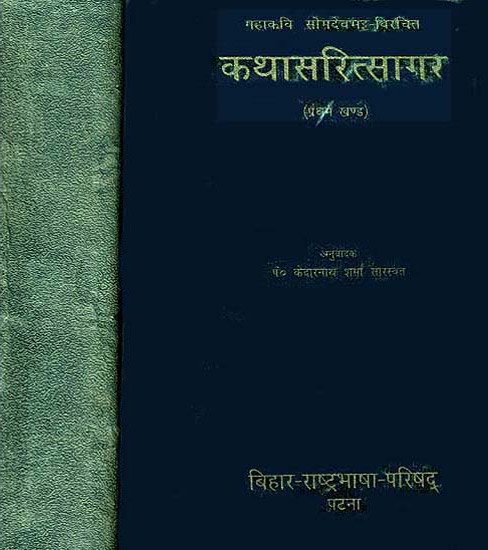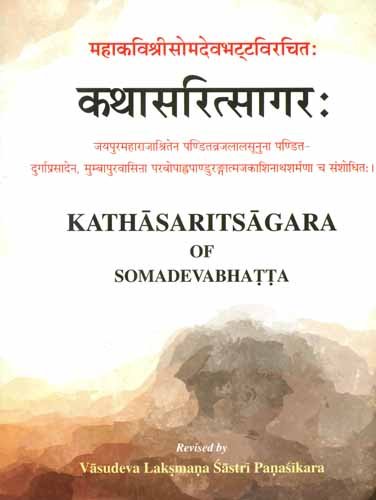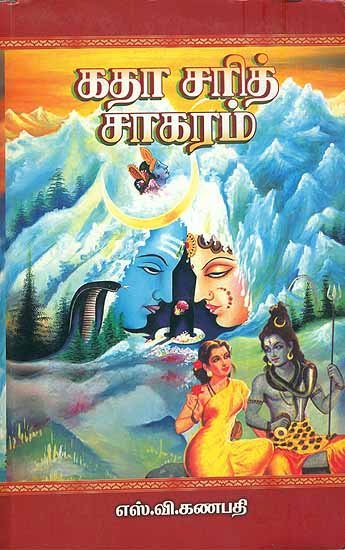Kathasaritsagara [sanskrit]
by C. H. Tawney | 2014 | 226,424 words | ISBN-13: 9789350501351
The Sanskrit edition of the Kathasaritsagara referencing the English translation and grammatical analysis. Written by Somadeva and dating from the 12th century, the Kathasaritsagara (or Katha-sarit-sagara) represents an epic legend narrating the adventures of Naravahanadatta as he strives to become the destined emperor of the Vidyadharas. Alternative titles: (Kathāsaritsāgara, कथासरित्सागर, Kathā-sarit-sāgara)
Verse 14.4.208
तद्बुद्ध्वा दयिताश् च बालसचिवाश्चाप्ताश् च विद्याधरास् ते ते वायुपथादयः सकटकाश्चित्राङ्गदाद्याश् च ते ।
गन्धर्वाः प्रसभप्रसाधितमहासिद्धेः प्रहर्षाकुलाः सत्त्वोत्साहधृतिप्रभावमहतीं तस्यास्तुवन्धीरताम् ॥ २०८ ॥
tadbuddhvā dayitāś ca bālasacivāścāptāś ca vidyādharās te te vāyupathādayaḥ sakaṭakāścitrāṅgadādyāś ca te |
gandharvāḥ prasabhaprasādhitamahāsiddheḥ praharṣākulāḥ sattvotsāhadhṛtiprabhāvamahatīṃ tasyāstuvandhīratām || 208 ||
The English translation of Kathasaritsagara Verse 14.4.208 is contained in the book The Ocean of Story by C.H. Tawney. This book is available online or you could buy the latest edition:
Read online Buy now! The English translation by C.H. Tawney (2014)
Glossary of Sanskrit terms
Note: This extracts Sanskrit terms and links to English definitions from the glossary, based on an experimental segmentation of verse (14.4.208). Some terms could be superfluous while some might not be mentioned. Click on the word to show English definitions.
Tad, Tat, Buddhva, Dayita, Bala, Saciva, Apta, Vidyadhara, Yushmad, Vayupatha, Aya, Ayas, Sakata, Citrangada, Gandharva, Prasabha, Prasadhita, Aha, Asiddhi, Praharsha, Akula, Sattvotsaha, Dhrit, Dhriti, Prabhava, Ahati, Tuvat, Dhirata,
Analysis of Sanskrit grammar
Note: this is an experimental feature and only shows the first possible analysis of the Sanskrit text (Kathasaritsagara Verse 14.4.208). If the system was successful in segmenting the sentence, you will see of which words it is made up of, generally consisting of Nouns, Pronouns, Verbs, Participles and Indeclinables. Click on the link to show all possible derivations of the word.
- Line 1: “tadbuddhvā dayitāś ca bālasacivāścāptāś ca vidyādharās te te vāyupathādayaḥ sakaṭakāścitrāṅgadādyāś ca te ”
- tad -
-
tad (indeclinable)[indeclinable]tad (indeclinable adverb)[indeclinable adverb]tat (indeclinable correlative)[indeclinable correlative]tad (noun, neuter)[compound], [nominative single], [accusative single]
- buddhvā* -
-
buddhvā (noun, feminine)[nominative plural], [vocative plural], [accusative plural]
- dayitāś -
-
dayita (noun, masculine)[nominative plural], [vocative plural]dayitā (noun, feminine)[nominative plural], [vocative plural], [accusative plural]
- ca -
-
ca (indeclinable conjunction)[indeclinable conjunction]ca (noun, masculine)[compound], [vocative single]ca (noun, neuter)[compound], [vocative single]
- bāla -
-
bāla (noun, masculine)[compound], [vocative single]bāla (noun, neuter)[compound], [vocative single]
- sacivāś -
-
saciva (noun, masculine)[nominative plural], [vocative plural]
- cā -
-
ca (indeclinable conjunction)[indeclinable conjunction]ca (noun, masculine)[compound], [vocative single]ca (noun, neuter)[compound], [vocative single]cā (noun, feminine)[nominative single]
- aptāś -
-
apta (noun, masculine)[nominative plural], [vocative plural]
- ca -
-
ca (indeclinable conjunction)[indeclinable conjunction]ca (noun, masculine)[compound], [vocative single]ca (noun, neuter)[compound], [vocative single]
- vidyādharās -
-
vidyādhara (noun, masculine)[nominative plural], [vocative plural]vidyādharā (noun, feminine)[nominative plural], [vocative plural], [accusative plural]
- te -
-
ta (noun, masculine)[locative single]ta (noun, neuter)[nominative dual], [vocative dual], [accusative dual], [locative single]tā (noun, feminine)[nominative dual], [vocative single], [vocative dual], [accusative dual]tad (noun, neuter)[nominative dual], [accusative dual]sa (noun, masculine)[nominative plural]sā (noun, feminine)[nominative dual], [accusative dual]yuṣmad (pronoun, none)[dative single], [genitive single]
- te -
-
ta (noun, masculine)[locative single]ta (noun, neuter)[nominative dual], [vocative dual], [accusative dual], [locative single]tā (noun, feminine)[nominative dual], [vocative single], [vocative dual], [accusative dual]tad (noun, neuter)[nominative dual], [accusative dual]sa (noun, masculine)[nominative plural]sā (noun, feminine)[nominative dual], [accusative dual]yuṣmad (pronoun, none)[dative single], [genitive single]
- vāyupathād -
-
vāyupatha (noun, masculine)[adverb], [ablative single]
- ayaḥ -
-
ayas (noun, neuter)[compound], [adverb], [nominative single], [vocative single], [accusative single]aya (noun, masculine)[nominative single]i (noun, masculine)[nominative plural], [vocative plural]e (noun, masculine)[nominative plural], [vocative plural], [accusative plural]
- sakaṭa -
-
sakaṭa (noun, masculine)[compound], [vocative single]sakaṭa (noun, neuter)[compound], [vocative single]
- kāś -
-
kās (noun, feminine)[compound], [adverb]kā (pronoun, feminine)[nominative plural], [accusative plural]
- citrāṅgadād -
-
citrāṅgada (noun, masculine)[adverb], [ablative single]citrāṅgada (noun, neuter)[adverb], [ablative single]
- yāś -
-
yā (noun, feminine)[nominative plural], [accusative plural]yā (pronoun, feminine)[nominative plural], [accusative plural]
- ca -
-
ca (indeclinable conjunction)[indeclinable conjunction]ca (noun, masculine)[compound], [vocative single]ca (noun, neuter)[compound], [vocative single]
- te -
-
ta (noun, masculine)[locative single]ta (noun, neuter)[nominative dual], [vocative dual], [accusative dual], [locative single]tā (noun, feminine)[nominative dual], [vocative single], [vocative dual], [accusative dual]tad (noun, neuter)[nominative dual], [accusative dual]sa (noun, masculine)[nominative plural]sā (noun, feminine)[nominative dual], [accusative dual]yuṣmad (pronoun, none)[dative single], [genitive single]
- Line 2: “gandharvāḥ prasabhaprasādhitamahāsiddheḥ praharṣākulāḥ sattvotsāhadhṛtiprabhāvamahatīṃ tasyāstuvandhīratām ”
- gandharvāḥ -
-
gandharva (noun, masculine)[nominative plural], [vocative plural]gandharvā (noun, feminine)[nominative plural], [vocative plural], [accusative plural]
- prasabha -
-
prasabha (noun, neuter)[compound], [vocative single]
- prasādhitam -
-
prasādhita (noun, masculine)[adverb], [accusative single]prasādhita (noun, neuter)[adverb], [nominative single], [accusative single]prasādhitā (noun, feminine)[adverb]
- ahā -
-
aha (noun, neuter)[compound], [vocative single]
- asiddheḥ -
-
asiddhi (noun, feminine)[ablative single], [genitive single]
- praharṣā -
-
praharṣa (noun, masculine)[compound], [vocative single]
- akulāḥ -
-
akula (noun, masculine)[nominative plural], [vocative plural]akulā (noun, feminine)[nominative plural], [vocative plural], [accusative plural]
- sattvotsāha -
-
sattvotsāha (noun, masculine)[compound], [vocative single]
- dhṛti -
-
dhṛti (noun, feminine)[compound], [adverb]dhṛti (noun, masculine)[compound], [adverb]dhṛtī (noun, masculine)[adverb]dhṛtī (noun, feminine)[compound], [adverb], [vocative single]dhṛtī (noun, neuter)[compound], [adverb], [nominative single], [vocative single], [accusative single]dhṛt (noun, masculine)[locative single]dhṛt (noun, neuter)[locative single]
- prabhāvam -
-
prabhāva (noun, masculine)[adverb], [accusative single]
- ahatī -
-
ahati (noun, feminine)[compound], [adverb], [nominative dual], [vocative dual], [accusative dual]
- im -
-
i (noun, masculine)[accusative single]
- tasyās -
-
sā (noun, feminine)[ablative single], [genitive single]
- tuvan -
-
√tu -> tuvat (participle, masculine)[nominative single from √tu class 2 verb], [vocative single from √tu class 2 verb]
- dhīratām -
-
dhīratā (noun, feminine)[accusative single]
Other editions:
Also see the following editions of the Sanskrit text or (alternative) English translations of the Kathasaritsagara Verse 14.4.208
Kathasaritsagar
by Kedarnath Sharma Saraswat (2005)
The Only Edition with the Sanskrit Text and its Hindi Translation (An Old and Rare Book) Set of 3 Vol.
Buy now!
Kathasaritsagara of Somadeva Bhatta (Sanskrit Text Only)
by Vasudeva Laksmana Sastri (2013)
Katha Sarit Sagar in Marathi
by H. A Bhave (1995)
Set of 5 Volumes; Published by Varada Books, Pune. 2256 pages (Throughout B/W Illustrations).
Buy now!
Katha Sarit Sagara (Tamil)
by S. V. Ganapati (எஸ். வி. கணபதி) (2014)
[கதா சரித் சாகரம்] Published by Alliance Publications.
Buy now!
Galpa Shono
by Abhijit Chattopadhyay (2014)
[গল্প শোনো] Galpa Shono: Bengali Translation of 'Suno Kahani From Katha Sarit Sagar'; 9788126015436; Published by Sahitya Akademi, Delhi.
Buy now!Preview of verse 14.4.208 in Bengali sript:
তদ্বুদ্ধ্বা দযিতাশ্ চ বালসচিবাশ্চাপ্তাশ্ চ বিদ্যাধরাস্ তে তে বাযুপথাদযঃ সকটকাশ্চিত্রাঙ্গদাদ্যাশ্ চ তে ।
গন্ধর্বাঃ প্রসভপ্রসাধিতমহাসিদ্ধেঃ প্রহর্ষাকুলাঃ সত্ত্বোত্সাহধৃতিপ্রভাবমহতীং তস্যাস্তুবন্ধীরতাম্ ॥ ২০৮ ॥
![Kathasaritsagara [sanskrit] - book cover](/uploads/a/Katha-Sarit-Sagara.jpg)




